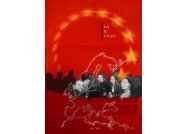turkish-greek civic dialogue - AEGEE Europe
turkish-greek civic dialogue - AEGEE Europe
turkish-greek civic dialogue - AEGEE Europe
You also want an ePaper? Increase the reach of your titles
YUMPU automatically turns print PDFs into web optimized ePapers that Google loves.
166<br />
Second exercise was a journey on the<br />
train. The participants split up into 4<br />
groups this time all of them assumed<br />
different roles such as a mother, punk,<br />
Bosnian immigrant, Croatian, lesbian.<br />
The groups were at the train platform<br />
and the conductor was telling them<br />
that there were no seats available<br />
on the train for all of them so they<br />
needed to decide among themselves<br />
one person who would get on the<br />
train to travel. After this exercise,<br />
the participants were provided with<br />
limited time to discuss over the issue,<br />
they later on presented their decisions<br />
and discussions to the whole group.<br />
The participants worked on drawing<br />
the portraits of the “friend” and the<br />
“enemy”. The first group brainstormed<br />
on the concept of the friend and the<br />
second group brainstormed on the<br />
concept of the enemy. At the end,<br />
both groups were combined and<br />
discussed together on the drawings of<br />
friend and enemy portraits.<br />
The next exercise was sculpturebuilding;<br />
participants built improvised<br />
sculptures inspired by some<br />
connotations. They discussed about<br />
the outcomes of the stereotypes<br />
came out of the ROAD MAP activity<br />
and they identified the stereotypes<br />
accompanied with their portrait of<br />
enemy.<br />
At the end of the workshop,<br />
participants worked on developing<br />
the concept of the sculpture they would build to present to the plenary as<br />
the outcome of the workshop. This presentation of sculpture should have<br />
presented the problems discussed, stereotypes and their alternative solutions.<br />
To this end, participants identified some factors that are creating problems in<br />
Turkish-Greek relations and they made analysis of movement. The presentation<br />
fascinated all Final Conference participants.<br />
THEATRE OF THE<br />
OPPRESSED WORKSHOP<br />
by Neslihan Özgüneş<br />
The Theatre of the Oppressed (TO) is the ensemble of techniques and approaches<br />
to theatre pioneered by the Brazilian theatre practitioner Augusto Boal. The<br />
common element of the various branches of this work is that all seek to make<br />
the power of theatre as a force for change available to everyone, particularly<br />
those in oppressed situations.<br />
One of the goals of our workshop was to work with assumptions and stereotypes<br />
and issues of conflict. Through the exercises and participation of the youth,<br />
we were able to touch on action and reaction to conflict, group dynamics, and<br />
expressing oneself in physical form. There seemed to be a reticence in terms<br />
of approaching controversial, conflicting issues, and an unwillingness to dive<br />
deeper into sensitive topics partly due to the lack of time.<br />
We were able to set up two Invisible theatre sketches that were played out<br />
in the final session in the amphitheatre. The first sketch, with some (Turkishin<br />
parenthesis because this only became relevant later) youth protesting two<br />
(Greek) ‘lesbians’ created a great deal of reaction. Four or five of the <strong>AEGEE</strong><br />
staff reacted in panic (not knowing of course that this was just theatre) and<br />
began to shout at the girls and boy complaining about the ‘lesbians’.<br />
While the intention of the exercise was to create a discussion about<br />
homosexuality and perspectives on homosexuality in our societies, the violent<br />
reaction of the staff (shouting at the youth “who do you think you are?” “Go<br />
Final Conference Association des Etats Généraux des Etudiants de L’<strong>Europe</strong>







